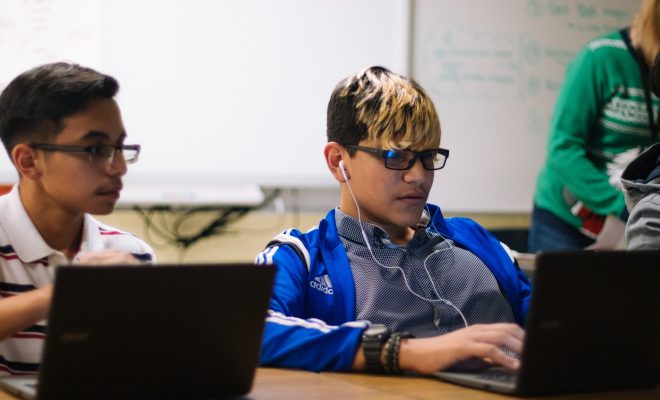Disengaged Students, Part 14: Educational Technology – Intellectual or Anti?

In this 20-part series, I explore the root causes and effects of academic disengagement in K-12 learners and explore the factors driving American society ever closer to being a nation that lacks intellectualism, or the pursuit of knowledge for knowledge’s sake.
Technology penetrates every aspect of society – even our K-12 classrooms. The way knowledge is delivered today takes the shape of tablets, and computer screens, and even in-class projectors. Does all the flash and glamor of the fancy gear take away from the basic pursuit of knowledge, though?
It Starts in Infancy
Early childhood educational technology targets children from infancy and makes it easier for parents to feel good about using media in the early childhood years. Television programs and videos claim to offer the correct answer to the parent’s question “What should my baby be learning?” Since such programming is developed by experts who certainly know more than the average parent about child development, these marketing ploys are accepted. Programs for infants are promoted as safe in small doses, as long as parents watch them with their little ones and participate too. Instead of reading books aloud, parents put children on their laps and spend a half an hour clapping along to classical music and gazing at bright, swirling colors on a screen.
This contrived form of “bonding” replaces tangible activities like rolling around on the floor, naming objects in the home or letting a baby turn the pages of sturdy board book. The American Academy of Pediatrics warns that children under the age of 2 should be exposed to NO screen time, but parents adjust the recommendation to fit their own family unit and routine, telling themselves that the APA warnings are for “other families” who use television or other media as a babysitter, not families like their own that use it as a form of early education.
Once the two-year mark is passed, it seems that children face a no-holds-barred attitude when it comes to television watching. A University of Michigan study found that television viewing among young children is at an eight-year high. Children between the ages of 2 and 5 watch an average of 32 hours of television every week between regular programs, videos, and programming available through gaming consoles. It is not the actual television shows that are harmful; in fact, the Journal of American Medical Association found that some educational television between the ages of 3 and 5 improves reading skills. It is the overuse of television and technology, and the underuse of basic learning activities like reading a book or playing with a ball, that lends itself to academic disengagement in the school years.
How Technology Warps the Learning Process
Even more active technological engagement, like using a computer or tablet for toddler learning activities, can foster academic disengagement by making the learning process entirely too easy. If a two-year-old child learns that the answer is always the touch of a screen away, how can the same child be expected to search for answers or show his work in his K-12 career? What parents today view as learning improvements are actually modern conveniences that devalue the pursuit of knowledge.
Though the eagerness to let technology replace traditional early childhood learning methods presents large-scale problems, the intent of the parents using that technology is often benign. Why not give children a head start on learning ABCs, colors and numbers that are easily taught through repetitious technology applications? Parents are not deliberately leading their pre-K offspring down the road of academic disengagement or anti-intellectualism for life, but when they allow technology to define early childhood learning, they sow the seeds of both problems. Questions that cannot be answered within a simple application format become too difficult, or too bothersome, for children to try to sort out later on.
Educators have not yet come to grips with the issue of parental dependence on technology. The first children who have had access to mobile applications from infancy are just beginning their K-12 careers and will likely see some of that technology made available in their classrooms. How will these children react when they are given a book to read, or when they receive a returned, marked-up math worksheet that requires editing by hand? Will these children scoff at the idea of non-digital requests, or handle them graciously as part of the learning process?
As with any technological progress in classrooms, mobile technology certainly has its positive place but educators (and parents before them) should also be asking what is being replaced – and how much of K-12 learning should be delegated to technology. Dependency on technology, particularly in relation to educational goals, is planted by parents (often unknowingly), and contributes to academic disengagement by making digitally enhanced learning too convenient and traditional learning pursuits too “boring”.






